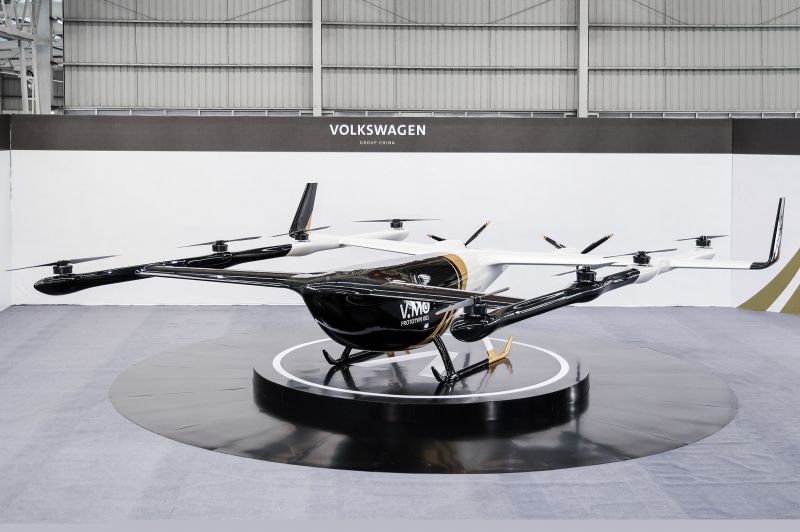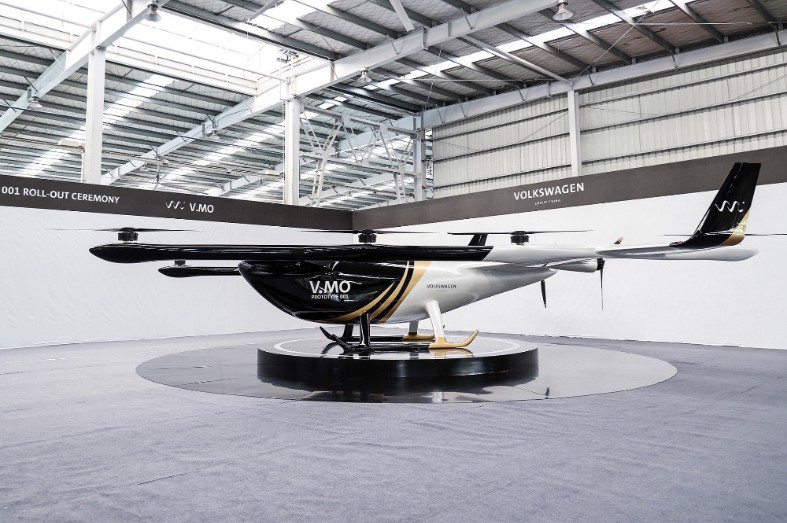Phone: +86 21 51559030
contact@galleon.cc
Volkswagen Group China Unveils its ¡®Flying Tiger' Electric Vertical Take-Off and Landing (eVTOL) Passenger Aircraft Prototype
Jul 28,2022¡¾Summary¡¿Volkswagen Group China (VGC), the joint venture of Germany-based Volkswagen Group, unveiled its first electric vertical take-off and landing (eVTOL) passenger drone prototype nicknamed "Flying Tiger". The eVTOL aircraft is part of the automaker¡¯s strategy to explore and break new ground in fully electric and sustainable mobility concepts. The prototype is based on VGC¡¯s existing autonomous driving and EV battery technology.

Volkswagen Group China (VGC), the joint venture of Germany-based Volkswagen Group, unveiled its first electric vertical take-off and landing (eVTOL) passenger drone prototype. The eVTOL aircraft is part of the automaker's strategy to explore and break new ground in fully electric and sustainable mobility concepts.
VGC launched its "Vertical Mobility" project in 2020 to explore the next generation of mobility solutions, which includes the urban air mobility (UAM) market that may one day wisk passengers in the sky over busy city traffic below.
The prototype aircraft was nicknamed the ¡®Flying Tiger' due to its distinctive black and gold exterior, which was selected to commemorate its launch in 2022, the Chinese zodiac "Year of the Tiger".
Like the "flying car" recently unveiled by Chinese electric vehicle maker XPeng Inc, the Flying Tiger prototype is based on VGC's existing autonomous driving and EV battery technology. The eVTOL aircraft features eight rotors for vertical lift and two propellers for horizontal flight.
VGC plans to conduct several flight tests later this year to optimize the concept. An improved prototype will undergo advanced test flights by late summer 2023.
The future version of the Flying Tiger eVTOL aircraft could eventually carry four passengers plus their luggage over a distance of up to 200km (125 miles).
"Through this pilot project, we are bringing Volkswagen's long tradition of precision engineering, design, and innovation to the next level, by developing a premium product that will serve the vertical mobility needs of our future tech savvy Chinese customers," said Dr. Stephan Wöllenstein, CEO of Volkswagen Group China. "The launch of this stunning validation model ¨C the V.MO ¨C is the first of many remarkable milestones on our exciting journey towards urban air travel, and a perfect example of our ¡®From China, For China' mission."
Along with many of China's automakers, Volkswagen Group China is rapidly expanding local R&D and software expertise to cater to its tech-savvy customers and significantly accelerate the pace of innovation.
The company says its Vertical Mobility project requires interdisciplinary and innovative thinking in an entirely new field. VGC said it formed a team of young, local experts to drive the project forward.
The Vertical Mobility project is supported by Chinese partners including aviation company Hunan Sunward Technology. The company specializes in aviation product development and is a market leader in the light sport aircraft industry.

UAM is a fast-emerging market in China and will utilize air space for short- and medium-distance connections between large cities. The use of passenger eVTOL aircraft is poised to play a significant role in the future of urban air transportation in China's congested megacities.
In the first phase of its commercial use, the eVTOL aircraft is likely to be pitched as a premium travel experience reserved for high-net worth, tech savvy Chinese customers, according to VGC. Among the use cases are VIP air shuttle services.
These eVTOL air taxis will be able to transport passengers more quickly and efficiently versus traveling in luxury vehicles on the ground.
Volkswagen Group China says it will work with the relevant Chinese authorities to achieve certification as the automaker's Vertical Mobility project expands.
Also this week, Xpeng Aeroht, a UAM company backed by electric vehicle maker XPeng Inc., started trial production of its Voyager X2 "flying car" at its factory in China.
The Voyager X2 is a closed cockpit, two-seater eVTOL. It's also capable of driving on roads using a foldable mechanism that retracts its rotors. The latest model is the sixth generation of the aircraft. The design language of the X2 is borrowed from XPeng's flagship P7 electric sedan, which is a competitor to Tesla's Model S.
Xpeng Aeroht shared a series of videos earlier this year that demonstrated how a typical urban commute might look like in its X2 eVTOL aircraft. The X2 can connect to airports and other transportation hubs, simulating how people might use an urban air taxi service.
In May, California-based eVTOL aircraft startup Joby Aviation was granted the Part 135 Air Carrier Certificate from the Federal Aviation Administration (FAA) that allows the company to begin commercial operations and carry passengers in its eVTOL aircraft.
Joby Aviation, which is backed by Japan's Toyota Motor Corp., said its received the certification ahead of schedule. It originally was expected to be granted in the second half of 2022. The rigorous requirements for the FAA's Part 135 Air Carrier Certificate makes it difficult for aviation startups to obtain.
Joby is among several well-funded aviation startups, including Germany-based aviation company Lilium, that are racing to develop eVTOL aircraft that can carry passengers. Now these companies will be working on air mobility alongside automakers like Volkswagen and XPeng.
Source£ºfuturecar
